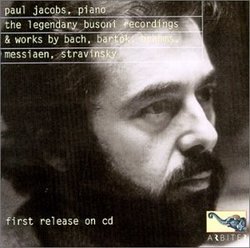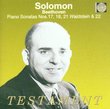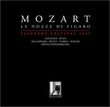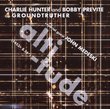| All Artists: J.S. Bach, Johannes Brahms Title: Legendary Busoni Recordings / Paul Jacobs Members Wishing: 0 Total Copies: 0 Label: Arbiter Release Date: 7/25/2000 Album Type: Import Genre: Classical Styles: Chamber Music, Forms & Genres, Sonatas, Historical Periods, Classical (c.1770-1830), Modern, 20th, & 21st Century Number of Discs: 2 SwapaCD Credits: 2 UPCs: 675754244323, 604907012427 |
Search - J.S. Bach, Johannes Brahms :: Legendary Busoni Recordings / Paul Jacobs
 | J.S. Bach, Johannes Brahms Legendary Busoni Recordings / Paul Jacobs Genre: Classical
Paul Jacobs, who died of AIDS in 1983, was a pianist of wide interests and prodigious abilities. He never made much of a solo career, but he became widely known for his contemporary music performances and his work with the... more » |
Larger Image |
CD DetailsSynopsis
Amazon.com Paul Jacobs, who died of AIDS in 1983, was a pianist of wide interests and prodigious abilities. He never made much of a solo career, but he became widely known for his contemporary music performances and his work with the New York Philharmonic. Fortunately, he was enlisted to make a series of recordings for the Nonesuch LP label. Unfortunately, Nonesuch has ignored most of them during the CD era. This collection, three complete LPs on two CDs, focuses on the music and transcriptions of Ferruccio Busoni, which is an acquired taste. Busoni had a fascinating mind, but you have to enjoy slithery chromatic harmonies to like most of his music--an exception is the wonderful Sonatina, based on themes from Bizet's Carmen. Jacobs had the sensibility and the technique to do justice to this difficult music. But many listeners may be even more impressed with his playing of etudes by Stravinsky, Bartók, and Messiaen, which is thoroughly brilliant and very exciting. Reviving these recordings must have been a real labor of love for the Arbiter label, but the artistic results certainly justify the efforts, and even the 1970s recorded sound holds up well. --Leslie Gerber Similar CDs
|
CD ReviewsSuperb, insightful playing John H. Flannigan | Chicago, IL USA | 10/24/2000 (5 out of 5 stars) "It's good to know that these fine recordings, long worn out in my LP versions, are finally available on CD. Congratulations to the Arbiter label for making them available to a new generation of music lovers. Jacobs' playing is accomplished on all levels--his incredible velocity, his smoothness, and his gorgeous touch are evident throughout. But the emotional intensity, particularly in the Bach-Busoni and Brahms-Busoni, is what carries these recordings into a very different realm. Busoni's mysticism is too rarefied for many performers, but Jacobs thrives in this atmosphere. Both Bach and Brahms emerge from these recordings in a different light, filtered through Busoni's genius and Jacobs' deep comprehension. They sound intensely modern, daring, and--most wonderful--completely fresh. Jacobs' recordings of Bartok, Messiaen, and Stravinsky are also revelations. The sound transfer is marvelous--all of Jacobs' crispness and warmth is there, with an element of thrill that was missing on the LPs. Buy this recording!" Sometimes wishes do become true... Lorin Ricker | Franktown, CO USA | 02/18/2001 (5 out of 5 stars) "I've had the black-vinyl recordings from Nonesuch since, at least, my college days, and I'd included these performances on my CD-purchase wish-list ever since I started collecting silver, expecting realistically to find only a bit of this repertory. I was astonished to find this 2-disk collection of *all* of Jacobs' Busoni sonatinas, plus the etudes by Bartok, Messiaen, Stravinsky, *and* the Bach-Busoni and Brahms-Busoni chorale preludes. These last two groups are worth the price of the set by themselves. As I recall, the sound of the Brahms-Busoni was, on the old Nonesuch LP, pretty dark and colorless... That's been somehow wonderfully rectified on this CD reissue. Jacobs' playing of the chorale preludes is magical, probably the best recorded to-date (I've heard rumors of a recital of the Bach-Busoni by John Ogdon on Altarus, but that's apparently never been released). The Busoni sonatinas are authoritative, and Jacobs reaches the depths of this sometimes-simple, sometimes-perplexing music to reveal it fully. The groups of etudes, some of the most difficult 20th-Century piano writing, and certainly some of the most explorative, are performed nearly perfectly. If you have any curiosity about XX-Cent piano literature, buy this disk-set! Essential for pianophiles and lovers of Bach, Busoni, Brahms, Bartok, et al." Insightful and Clear I. Martinez-Ybor | Miami, FL USA | 05/20/2008 (4 out of 5 stars) "Paul Jacobs was a magnificent pianist and inescapable musical intellect in the New York of the 1960's and '70's. His straightforward style was not appreciated by some, and his awesome intellectual acumen would probably be intimidating to most. It certainly was not appreciated by the lady pianist who came into town surrounded by acolytes in the press and the audience as the brightest new exponent of the most intractactable contemporary scores, only to be taken to task in the NYTimes by Jacobs himself who had followed her recital, scores in hand, and had documented the swathes of wrong and invented notes the pianist had played in lieu of what the score mandated. I had never seen such a well documented case of the "empress wore no clothes." The pianist has not been heard from since, and her sycophants in the music establishment became very still and forgetful. Indeed Paul Jacobs was unique. And these recordings document his art at its brilliant best (there are also some wonderful Debussy Etudes elsewhere as well as what I think is the fastest Waldstein ever recorded, his Elliot Carter discs). The conceptions are lucid, the playing is clear and totally balanced so that every note is heard the way it was conceived. Pedaling sounds sparse. The aim is for chaste, musical integrity of the highest order and conveyance of unencumbered musical values. Jacobs does not disappoint.
Upon hearing the CD's, I remembered something that had bothered me when I got the Nonesuch LP originals. At the time I hated the piano sound. Of course, I think of no other area in which digital technology has brought greater benefit than in recording piano. These CD's achieve a clarity, color and dynamic range that the LP's at best only hinted at. What the CD's could not correct was the claustrophobic recording quality in the original source material. The instrument sounds recorded very close, as if in a piano practice room. There is no air around the piano and the sound is dry. What I may then have thought were faulty Nonesuch pressings perhaps was an artistic choice by Jacobs himself, textual clarity being his paramount aural objective. In the event, today on CD I still find the sound tiresome for extended listening, even if it reveals fully individual scores. In a way this may help the Busoni pieces which, under other fingers, are often swamped with pedal into indefinable mush. This recording peculiarity does not invalidate the performances in any way, but the listener should be aware not to expect the ambiance of most piano recordings being put out today, even reissues. And perhaps the preferred method of listening may be a handful of pieces at a time. The selections lend themselves to such programming. Nonetheless, to be fair, I took away a star for this. The material is priceless. It is indeed difficult to find such collection of rare Busoni, Stravinsky, Bartok, and Messiaen piano music on a single program. Anyone interested in piano music should acquire this set. Paul Jacobs death came as a shock and was mourned by many; he was the first major musical figure felled by AIDS." |

 Track Listings (20) - Disc #1
Track Listings (20) - Disc #1



